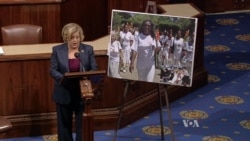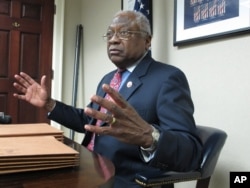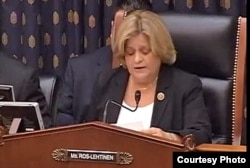U.S. lawmakers have watched President Barack Obama’s trip to Cuba closely and have offered decidedly mixed reactions, with sharp disagreements about whether Washington’s opening with Havana will foster change on the island or further entrench a communist dictatorship.
“This normalization effort has been an abject failure for freedom and democracy on the island,” Republican Representative Ileana Ros-Lehtinen of Florida, a prominent Cuban-American member of Congress, said on the House floor.
“The Castro regime has already stated that it will not change one bit after all of these [U.S.] concessions. The Cuban people deserve better,” she added.
Even trip supporters are troubled by crackdowns on Cuban dissidents, including on the day Obama arrived.
“You’re not where you are going to be where you need to be, if you don’t allow contrary voices to be heard,” Representative James Clyburn of South Carolina, the House assistant Democratic leader, told VOA.
But Clyburn noted that if engagement with Cuba has not brought about sudden change, neither did decades of isolation.
“I very much support normalizing relations with Cuba, because what we’ve done for the last half-century has not worked,” he said.
California Democrat Janice Hahn said she hoped for long-term, positive change — “a little breathing room now for the Cuban people, and a little more hope that this new relationship with their friend, the United States, could really translate to a better economy, better lives, better jobs and hopefully less oppression.”
Economic embargo
While Obama and Cuban President Raul Castro both called for ending the U.S. economic embargo of Cuba, Republicans, who control Congress, said no.
“The president supports plans to end the embargo, yet ignores the fact that increased trade will not reach the Cuban people,” said South Carolina Representative Joe Wilson. “It will benefit the Cuban military and intelligence agencies.”
Analysts note that Obama has loosened some aspects of the embargo.
“Obama has put all these cracks in it, by taking a lot of executive actions that really fill the embargo full of holes,” said Elizabeth Newhouse of the Washington-based Center for International Policy. “He’s allowing a lot of licensing of commercial products and allowing much more expanded travel, and financial regulations have been loosened.”
Long-term debate
America’s opening with Cuba is likely to be debated for years to come.
“America, under the Obama administration, has forsaken those who suffer under Castro’s oppression," Ros-Lehtinen said. "That’s a sad fact. And this will be President Obama’s legacy.”
“The eyes of the world are even more now on President Castro and the Cuban people to really live up to the idea that we will have normal relations,” said Hahn.
Whether the opening endures may depend on who is elected in November to succeed Obama.







